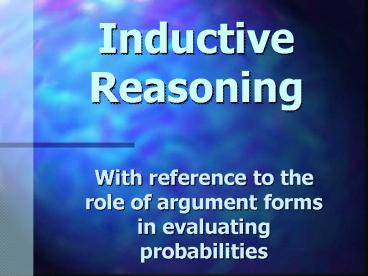Inductive Reasoning
1 / 14
Title: Inductive Reasoning
1
Inductive Reasoning
- With reference to the role of argument forms in
evaluating probabilities
2
Getting Started
- First, one becomes interested in something
3
Getting Started
- First, one becomes interested in something
- Call it Y
4
Getting Started
- First, one becomes interested in something Y
- Next, one notices some things about it
Y has properties a, b, c...n
5
Getting Started
- First, one becomes interested in something Y
- Next, one notices some things about it
- Because we somehow care about or are concerned
about Y, a question arises - Is what we are able to observe personally or find
out from someone else all we can reasonably
believe about Y?
Y has properties a, b, c...n
6
The next question is...
What else is probably true of Y?
7
The next question is...
What else is probably true of Y?
8
The Analogical Form of Inductive Reasoning
- We are interested in Y
- We notice Y has properties a, b, c...n
9
The Analogical Form of Inductive Reasoning
- We are interested in Y
- We notice Y has properties a, b, c...n
- We recall X has properties a, b, c...n
10
The Analogical Form of Inductive Reasoning
- We are interested in Y
- We notice Y has properties a, b, c...n
- We recall X has properties a, b, c...n
- We recall X also has property p
11
The Analogical Form of Inductive Reasoning
- We are interested in Y
- We notice Y has properties a, b, c...n
- We recall X has properties a, b, c...n
- We recall X also has property p
In our minds, these facts resolve themselves into
an analogical argument almost automatically.
12
The Analogical Form of Inductive Reasoning
- Premise 1 X has properties a, b, c...n
- Premise 2 Y has properties a, b, c...n
- Premise 3 X also has property p
- Conclusion Y has property p
This is obviously an inconclusive argument, but
sometimes the information we have is
unsatisfyingly fragmentary.
13
A Way of Assessing Strength of an Inductive
Argument
- After determining the conclusion and the premises
of the argument, including anything that is
unstated, arrive at a preliminary assessment of
the strength of the argument. - Consider whether additional premises could make
the argument stronger. If it is easy to imagine
ways the argument could be stronger, then the
initial assessment of strength may need to be
revised downward. Exercise care if tempted to
revise the assessment of strength upward,
however this is a very different situation.
14
The Bottom Line For All Inductive Reasoning
- Is the conclusion of the argument more likely to
be true than its contradictory? - THIS IS IMPORTANT!































